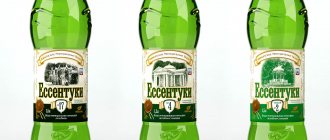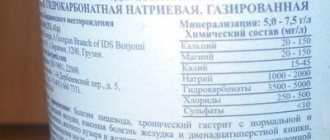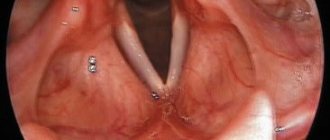- Selection of mineral water
- Mineral water with high acidity
- Low acidity water
- Mineral water for gastritis
- Drinking water with normal stomach acidity
- Useful tips
- Contraindications
Mineral water for gastritis, esophagitis and pancreatitis is a good therapeutic and preventive remedy, the benefits of which cannot be underestimated. It regulates acidity in the stomach, reduces discomfort, balances intestinal functions and has a healing effect on the body. The main thing is to figure out what mineral water to drink if you have gastritis or other diseases.
Which mineral water to choose?
Before purchasing mineral water that is useful for gastritis or esophagitis, we recommend talking to a gastroenterologist. The specialist will conduct an examination and determine the appropriate water based on the diagnosis. The most important selection criteria are:
- gastric acidity level;
- the presence of ulcerative lesions of the mucous membrane;
- liver or gall pathology (for example, with gastritis and pancreatitis).
And it is important to note that carbonated mineral water is strictly prohibited for any gastritis (erosive, atrophic, etc.). Carbon dioxide can cause complications in the form of reflux, in which stomach contents enter the esophagus and worsen the patient’s well-being.
Most often, gastritis is accompanied by high acidity, so alkaline bicarbonate water is suitable. The mineral water will be able to neutralize excess acid and help treat the hyperacid form of gastritis, even during exacerbation.
If gastritis is hypoacid or atrophic, you need acidified mineral water. It will relieve discomfort and restore the functions of the mucous membrane inside the stomach.
How much water should you drink per day
It is believed that the daily fluid requirement of an adult is 20-40 ml per 1 kg of body weight. It turns out that the minimum daily consumption of a person weighing 70 kg is approximately 1700 ml. Maybe 2 liters. Maybe a little more.
This means TOTAL liquids. Comes with food (soup-tea-coffee), and with vegetables and fruits.
Subtract from these 2 liters what was absorbed in food. You need to fill the remainder with pure water. Pure water should be taken in sips between meals.
Increased acidity
What mineral water can you drink for gastritis accompanied by high acidity? Patients with this form of the disease usually feel very unpleasant, so you need to follow a diet and avoid excesses in the diet. Along with proper nutrition, doctors sometimes recommend mineral water with an alkaline composition.
So-called hydrocarbonate waters suppress the secretion of hydrochloric acid by the stomach by binding hydrogen ions. The secretion of mucus increases, eliminating the appearance of excessive HCI. Proper intake of alkaline mineral water will eliminate heartburn and nausea.
With gastritis, which is characterized by high acidity, it is better to drink water at room temperature, not cold, 30 minutes before meals. It is recommended to repeat the dose up to 3-4 times a day, and the duration of the course is prescribed by the doctor (usually from two weeks). Which mineral water is best for acidity and gastritis? Doctors most often recommend:
- Dilijan;
- Borjomi;
- Nartan;
- Talitskaya.
Question answer
Which is better Essentuki or Narzan?
Narzan is more often recommended for use for problems with digestion. This is carbonated water with low mineralization - 2-3 g/l. and is well suited for people who have a negative attitude towards the strong saltiness in the taste of the drink. Narzan refers to table water, in comparison with the Essentuki drink, it has a less pronounced clinical effect.
Which is better Essentuka or Borjomi?
Borjomi is similar in chemical composition to Essentuki water, but the latter contains a larger salt volume. Both types belong to the mineral sodium bicarbonate liquid.
Borjomi, unlike Essentuki water, cannot be drunk if you have pancreatitis. You should also not drink the drink if you have low stomach acidity, migraines, arthritis or heart problems.
Borjomi is not recommended to be consumed every day due to its high fluoride content, which can lead to fluorosis. Initially, the disease affects bones and teeth, and subsequently has a negative impact on the functioning of the entire body. In terms of pricing policy, Essentuki is a cheaper drink.
Low acidity
What mineral water is useful for low acidity with gastritis, including exacerbations? With such a violation, a mineral water with a pH of up to 7 units is required to prevent belching and bloating. Water will facilitate the absorption of food in chronic gastritis and eliminate discomfort.
The best mineral water for atrophic gastritis will be one that not only regulates acidity, but also restores the secretory functions of the stomach. The functioning of the mucous membrane is normalized by stimulating the gastric walls, for which alkaline waters are responsible:
- Narzan;
- Essentuki 4 and 17;
- Izhevskaya;
- Berezovskaya.
You need to drink 1/3 cup half an hour before meals, but gradually increase the amount of water to 150-200 ml.
What mineral water should you drink if you have stomach problems and why?
In the treatment of diseases of the stomach and intestines, a large role is given to drinking mineral water.
But just as there is no general cure for the stomach, there are no general recommendations for taking mineral water for gastrointestinal diseases. Each problem requires its own solution. For what diseases is Narzan prescribed, and when is it better to drink a glass of Borjomi? You will learn about this and much more from our material. Our information:
Diseases of the gastrointestinal tract (GIT) are pathologies of one or more digestive organs: the esophagus, stomach, pancreas, liver and intestines. They belong to the group of the most common diseases in the world. The most common gastrointestinal diseases include:
- Peptic ulcer of the stomach and duodenum
- Inflammatory processes of the gastrointestinal tract, such as cholecystitis and gastritis
- Various pathologies of the pancreas, in particular pancreatitis
- Liver diseases (cirrhosis, hepatitis, non-alcoholic fatty liver disease)
What does Essentuki help with and what are the benefits of chloride and alkaline sources?
Remember how in the film “Office Romance” Olenka boasts to Samokhvalov that her husband “had his ulcer cut out” and then given a free trip to Essentuki? In Soviet times, all “ulcer sufferers” (as well as diabetics) were indeed sent to the Essentuki resort to be treated with local mineral water “Essentuki-4” or “Essentuki-17”. Of all the mineral waters, Essentuki springs are most suitable for treating the gastrointestinal tract. Why?
- Firstly, this water belongs to the class of chloride-bicarbonate, that is, it contains a large number of negative chlorine ions (read about what types and classes mineral waters are divided into in our material “Mineral springs: learning to understand the intricacies.” Chloride springs in their chemical composition they are most “related" to human biological fluids. Chloride electrolyte (that is, solution) plays an important role in our body. It is found in digestive juices, pericellular fluid and red blood cells. In the stomach, it is a key component of gastric juice, promotes proper digestion and absorption of nutrients, and also maintains an optimal level of acid-base balance (pH). But what to do if there is not enough chloride electrolyte in the stomach? It’s right to get it from the outside along with chloride mineral waters, which are Essentuki.
- Secondly, in terms of acidity, Essentuki belongs to alkaline mineral waters. Alkaline water activates metabolic processes in the human body and normalizes the functioning of the entire gastrointestinal tract. But in fairness, it must be said that Essentuki is not the most alkaline mineral water: the championship here belongs to the Georgian Borjomi water.
- Thirdly, Essentuki is carbon dioxide water: it contains a large number of carbon dioxide bubbles, which have a mechanical (irritating) effect on the walls of the stomach and the oral mucosa, as a result of which the reflex function of the gastrointestinal tract improves.
Essentuki is prescribed for a variety of gastrointestinal and liver diseases
. But first of all this:
- Ulcer of the stomach and upper small intestine
- Gastritis – superficial, mixed, atrophic, erosive
- Chronic pancreatitis
- Gastroesophageal reflux disease
- Inflammation of the esophagus (esophagitis)
- Gallbladder pathologies
- Diabetes and metabolic disorders
The difference between Essentuki-4 and Essenuki-17 water for gastrointestinal diseases is not of fundamental importance.
But if you suffer from hypertension or kidney disease, then give preference to Essentuki-4, since Essentuki-17 contains more salt. You can find more detailed information on this topic in our material about “Essentuki-4” and “Essentuki-1”. How to drink
: Essentuki type water is recommended to be consumed warm (at body temperature), one glass three times a day, 30-40 minutes before meals, in small sips. If you drink bottled Essentuki, release excess gas from the water before drinking.
Is it too late to drink Borjomi?
Ancient folk wisdom tells us that Borjomi should be drunk for kidney disease.
However, this is not entirely true. Georgian Borjomi water has almost the same list of indications as Essentuki, but with minor differences. Unlike Essentuki, Borjomi belongs to the class of hydrocarbonate waters. Chloride ions are also present in it, but in very small quantities. But, as mentioned above, it has a higher pH level (7.5 - 8.3). This means that Borjomi is especially effective for diseases that can occur with increased stomach acidity (peptic ulcers, heartburn).
In addition, Borjomi contains less salts, so it can also be consumed as table water (just to quench thirst). As for kidney and urinary tract diseases, for such diagnoses Borjomi water can also be prescribed, but only as an additional treatment.
Main indications for Borjomi treatment:
- Ulcer of the stomach and duodenum
- Chronic gastritis
- Diseases of the esophagus
- Pancreas problems
- Pathologies of the liver, gallbladder and biliary tract
It is recommended to drink Borjomi mineral water in the same way as Essentuki - slightly warmed 30-40 minutes before meals three times a day. Read more about Borjomi in the material “Borjomi: the most popular mineral water in the USSR.”
Narzan: sulfate or dolomite - which is better?
Another mineral water that is prescribed for gastrointestinal diseases is Kislovodsk Narzan. Kislovodsk Narzan belongs to sulfate-hydrocarbonate waters (contains a large number of negatively charged sulfur ions). Keep in mind that sulfate waters have a mild laxative effect, so they are prescribed if you are prone to constipation. In addition - as the name of the Kislo-Vodsk resort suggests - this water is acidic, not alkaline, and has a pH level of about 6.0. Therefore, it should be used with caution if your stomach acidity is already high. If you often experience heartburn, it is better to avoid Narzan altogether.
If a doctor prescribes Narzan for you, be sure to specify which Narzan he means. The fact is that there are three varieties of this drink: sulfate, dolomite and general. And each of them has its own list of indications.
- Narzan sulfate (which has the highest degree of mineralization and contains more sulfur ions) improves gastric secretion, promotes better absorption of food, regulates intestinal function and reduces bloating.
- Dolomite narzan (having a medium degree of mineralization) improves metabolism and accelerates the removal of toxins from the body.
- General narzan does not have a pronounced healing effect and is consumed mainly as table water.
In general, the main indications for using Narzan are:
- Diseases of the esophagus, including gastroesophageal reflux disease
- Chronic gastritis
- Bowel diseases, including irritable bowel disease
- Pancreatic diseases
- Metabolic disorders
The regimen for taking Kislovodsk mineral water depends on the specific type of Narzan and should be discussed with your doctor.
You can read more detailed information about Narzan in our material “Kislovodsk Narzan: a drink for healthy people.” Other types of mineral water that we have not listed here can be used to treat stomach and liver diseases. But they do not have a pronounced effect in the treatment of gastrointestinal diseases and are most often used as auxiliary or supportive agents.
Text: Ekaterina Maslova
Normal acidity
When the level of stomach acidity due to gastritis, pancreatitis or esophagitis is normal, doctors may recommend drinks from the following brands:
- Sevan;
- Dragovskaya;
- Essentuki 4;
- Hot key;
- Crimean.
These drinks have a neutral pH level, so they do not affect secretory activity. In turn, they trigger peristalsis, saturate the patient’s body with the most important elements and improve overall well-being.
Useful properties of Essentuki water
Treatment with this drink has a positive effect on the functioning of many functions of the human body:
- promotes the effective elimination of mucus formed in the presence of inflammation in the stomach and respiratory system;
- improves stomach activity, has a mild laxative effect on the intestines;
- has a beneficial effect on the functioning of digestion, liver and kidneys;
- normalizes metabolic processes due to increased enzyme production.
Drinking water is effective for weight loss because it helps normalize the body's metabolism. Use for preventive purposes helps improve the functioning of the immune system, enhance endurance, and ensure high-quality removal of chemicals from the body. Drinking the drink reduces the negative impact of stressful situations and negative external factors.
Atrophic and erosive
Zero acidity of juice in the stomach is characteristic of atrophic gastritis, which cannot be cured with mineral water. Drinks will help alleviate the condition, but doctors additionally prescribe medications to replenish the secretion deficiency.
With atrophic gastritis, stagnation in the stomach is dangerous, so you need to eat little by little. Mineral water for the atrophic form is the same as for gastritis with low acidity.
In the case of erosive gastritis, there is a risk of the disease developing into an ulcer. Drinks and all food should be gentle, so mineral water should be exclusively without gases and at room temperature. Use no more than 50 ml at a time. If erosive gastritis is accompanied by colitis, pancreatitis or hepatitis, the doctor may give separate recommendations to the patient.
Raw or boiled?
It is healthier for the body to drink raw water, as it contains important microelements: magnesium, calcium, sodium, etc. After boiling, these components settle on the heating elements, and the water loses its beneficial properties. In addition, heat treatment pushes out an equally important element from the water - oxygen, and therefore water loses its properties as a transport fluid and can form edema.
“Raw” is considered to be bottled still water, spring water, and tap water. The best choice would be bottled water, as its safety is guaranteed by the manufacturer. To drink water from a tap or a natural source with health benefits, you need to make sure it is safe - conduct a chemical analysis that will show whether there are harmful impurities or dangerous bacteria in the water. Also a good solution would be to use a special filter.
Speaking about the advantages of boiled water, it is worth noting that this method of processing removes harmful bacteria from the liquid and makes the water safer. If you prefer to drink boiled water, then try to adhere to the following rules:
- Before boiling, let the water sit for 2-3 hours;
- Turn off the kettle when the water begins to boil;
- Do not store boiled water, drink it fresh.
General tips for use
Whether it is possible to drink mineral water to treat gastritis and whether it is beneficial, you should have no doubts. The main thing is to take into account the recommendations of doctors, which will allow you to get only a positive effect.
You need to start drinking mineral water with 1/3 glass and gradually increase the dose. If the acidity of the stomach is increased, it is better to heat the water to 35-40 degrees, and if it is low, a drink at room temperature is suitable. In both cases, mineral water is drunk before meals.
The course of treatment lasts from a couple of weeks to a couple of months, after which a break is required, and then the regimen is repeated. When a patient suffers from chronic esophagitis, the benefit of mineral water treatment will be if the course is repeated every 4-6 months.
The benefits of medicinal mineral water
When, when heaviness in the abdomen or stomach pain occurs, a person does not drink a bunch of pills, but consults a doctor and begins, following the recommendations, to drink mineral water, he will definitely feel relief.
After treatment:
- Salt balance is normalized.
- The body is saturated with useful substances.
- Acidity decreases.
- The production of enzymes is accelerated.
- Peristalsis increases.
Attention! The patient no longer suffers from heartburn, and the specific smell from the mouth disappears. Food is digested faster, a person no longer suffers from constipation or stomach pain.
Some contraindications
Mineral water for gastritis can cause side effects in the form of flatulence if you drink a carbonated drink. It is better to buy water without gas. Also, during exacerbation of gastritis, it is better to abstain from mineral water, so as not to worsen the course of the disease.
You should not drink water for too long and in large quantities, so that stones do not begin to appear in the kidneys or gallstones. Caused by excess salts in the body. If there are stones, the doctor may prescribe mineral water for gastritis or pancreatitis in a minimal dosage.
When exactly is it not possible?
Despite the beneficial composition of mineral water, there are a number of contraindications to its use .
problems with blood circulation;- cardiovascular disorders;
- gastritis in the acute stage;
- serious disruptions in the gastrointestinal tract;
- severe vomiting and nausea;
- any bleeding;
- alcohol intoxication and hangover;
- children under 3 years of age;
- toxicosis in late pregnancy.
Women carrying a baby should consult a doctor about the permitted type and dosage of mineral water.
You should not drink mineral water uncontrollably, which can lead to:
- disruption of metabolic processes,
- burping,
- damage to tooth enamel.
- stone formation in the kidneys and gall bladder.
You should know that if you have gastritis, you should not drink mineral water with gas. It irritates the walls of the stomach or can cause a sudden release of gastric juice, which will lead to a burn of the mucous membrane.
Types of mineral water for the gastrointestinal tract
All types of mineral water are divided into three classes according to their intended purpose:
- medicinal,
- medical dining rooms,
- dining rooms
The former are used to treat stomach ulcers, gastritis with low or high acidity, and heartburn.
The second is to prevent stomach diseases and maintain good health. Still others - to quench thirst with a healthy and sick stomach. Each variety has its own degree of mineralization:
- Medicinal – more than 10 g/l.
- Medical dining room - from 1.5 to 10 g/l.
- Dining room – up to 1 g/l.
Water with a high degree of mineral saturation (more than 18 g/l) is not recommended for consumption.
The second division into groups is based on the chemical composition of the water.
Depending on which components predominate, there are several types of mineral waters that are useful for the gastrointestinal tract :
- hydrocarbonate;
- chloride;
- sulfate;
- bromine, iodine.
The strongest influence on the functioning of the organ is exerted by:
- hydrocarbonate,
- sulfate,
- chloride varieties.
They regulate the acidity of digestive juices and gastric motility, stimulate or, conversely, suppress the functioning of the gastric glands. Bromine and iodine varieties of water have a slightly less impact.










